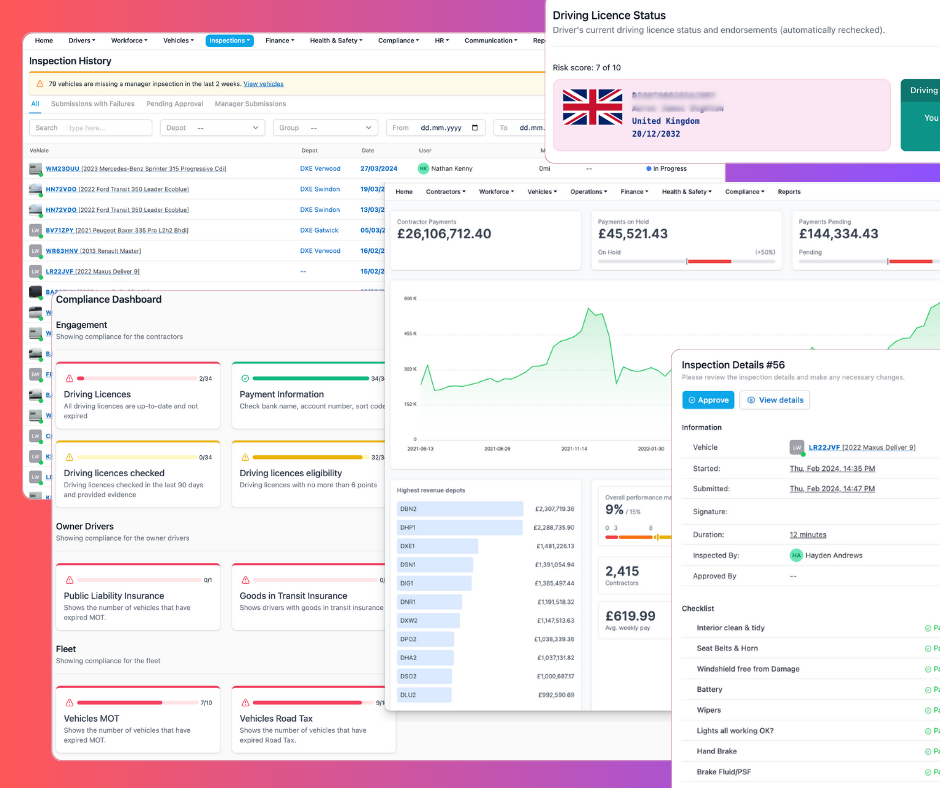
PCN Management Strategies for Fleet Ops | Zerity
Struggling with penalty charge notices? Efficient PCN management is key to keeping your fleet on the road and your costs down. Discover essential strategies that streamline PCN handling and safeguard your operation from financial drains.
- Key Takeaways
- Understanding PCN Management and Its Importance
- Effective Strategies to Minimize Fleet PCNs
- Utilizing Fleet Management Software for Efficient PCN Handling
- Selecting the Right PCN Management Service for Your Fleet
- Case Study: Successful PCN Management Implementation
- Summary
- Frequently Asked Questions
Key Takeaways
-
Proactive PCN management is essential for fleet operations, involving driver education, data analysis, and collaboration with local authorities to minimize financial implications and operational disruptions caused by penalty charges.
-
Fleet management software is a critical tool in PCN management, offering automation in payment and challenges, as well as monitoring driver behavior to enhance efficiency and reduce the incidence of PCNs.
-
Choosing the right PCN management service requires careful assessment of features, capabilities, and pricing plans to ensure cost-effectiveness and a strong return on investment for the fleet operation.
Understanding PCN Management and Its Importance

PCN management is fundamentally about:
-
Keeping track of, overseeing, and disputing PCNs that are levied on a company
-
Acting as the primary safeguard against interruptions that could affect business continuity
-
It’s a delicate equilibrium where poor management of traffic penalties can have substantial repercussions by impairing the financial health of the business and hindering efficient daily operations.
For those who operate fleet services, adopting an anticipatory stance in managing PCNs is essential. This strategy serves not merely as an added benefit, but as a critical defense mechanism to prevent possible operational disruptions and associated monetary consequences.
The role of PCNs in traffic control
Penalty charge notices, also known as PCNs or parking charge notices, are crucial tools for maintaining traffic regulation. Their implementation serves to:
-
Aid in the management of traffic circulation
-
Diminish vehicular congestion
-
Uphold adherence to parking guidelines and laws
-
Promote organized parking and vehicle movement
-
Alleviate overcrowding, especially in densely populated urban zones where there is a high demand for limited parking space.
For companies with fleets of vehicles, these penalty charge notices act as essential instruments that facilitate orderly business functions.
Financial implications of PCNs on fleets
Conversely, PCNs can pose a considerable financial burden on the fleet. The potential costs and the threat of extra administration fees could strain fleet budgets, much like a weak spot that could lead to fiscal setbacks and operational disruptions.
These obstacles serve to present an opportunity for improvement. Fleet managers who gather and scrutinize data related to PCNs are able to detect trends and areas prone to issues, playing a critical role in diminishing fines. Employing such insights not only aids in dodging penalties, but also supports crafting successful strategies for forthcoming endeavors.
Effective Strategies to Minimize Fleet PCNs

Reducing the number of Penalty Charge Notices (PCNs) for a fleet hinges on several tactics, which include educating drivers, examining data patterns and working in conjunction with local governing bodies. By embedding information regarding parking regulations and limitations into the sessions that train drivers, it’s possible to considerably cut down on PCNs by making certain that the drivers are thoroughly versed in adherence protocols.
Empowering drivers through knowledge serves as an essential initial move to decrease the frequency of PCNs. Being equipped with this information arms them with what they need to evade infractions effectively.
Driver education and training
Educating and training drivers is a fundamental aspect of reducing the incidence of Penalty Charge Notices (PCNs). Providing ongoing education that includes understanding parking regulations and permissible waiting periods can enhance adherence to these rules. Important focus areas for driver training include:
-
Ensuring vehicles are parked in the direction of traffic flow
-
Parking adjacent to the curb to minimize disruption
-
Avoiding pavement parking and obstructed dropped kerbs unless there’s clear authorization indicated by signs
Adhering to these principles, drivers can notably decrease their chances of facing parking fines.
Drivers who are well-informed about such regulations tend not only to incur fewer PCNs, but also contribute significantly to improving overall operational efficiency.
Data analysis and hotspot identification
Regular data assessment is crucial for making educated decisions within fleet operations. Utilizing both specialists in penalty charge notices and sophisticated fleet management systems, one can discern patterns of frequent PCN issuance, thus informing strategies aimed at decreasing such incidents. By leveraging this analytic process, particular pathways or timeframes that result in a surge of PCNs are revealed. Consequently, allowing those managing fleets to direct drivers clear of these troublesome zones.
By scrutinizing the information regarding PCNs and implementing strategic network alterations—such as adjusting delivery schedules or modifying travel routes—the incidence of receiving penalty charge notices can be notably diminished.
Collaborating with local authorities
To minimize incidents within the primary care network, engaging with local authorities and communities can foster innovative solution development. It is advised that fleet managers work in concert with these authorities to:
-
Examine persistent challenges related to deliveries
-
Devise strategies that aim at minimizing PCN occurrences
-
Adapt their delivery timetables proactively in accordance with local loading and offloading rules
-
Engage in dialogue about alternative parking arrangements and timing schedules
By adopting this proactive approach to the primary care network, it’s possible not only to decrease the frequency of PCNs, but also enhance efficiency concerning primary care services by intelligently rescheduling delivery times.
Collaboration emerges as a pivotal aspect of strategic leadership within management of a PCN framework. Under the guidance and oversight of the clinical director, it becomes integral for successful project management and fostering synergy among member practices involved.
Utilizing Fleet Management Software for Efficient PCN Handling

Software dedicated to managing fleets has revolutionized the process of handling PCNs. It enables fleet managers to automate both payment and contesting processes, as well as track driver actions, giving them comprehensive control over efficient PCN resolution.
For example, when a company with an extensive fleet adopted Chevin’s Fleetwave software for their fleet management needs, they experienced a notable decrease in parking penalties. These digital solutions simplify workflow by pinpointing alternative parking options and enhancing overall operational efficacy – proving themselves essential for effective PCN administration.
Automating payments and challenges
Efficient management of Penalty Charge Notices (PCNs) hinges on the power of automation. Systems designed for fleet management come equipped with features that automate the monitoring and challenging process for fines, providing avenues to promptly settle or contest and pay them in accordance with legal deadlines. The introduction of software such as Fleetworks into fleet operations markedly cuts down the duration required to manage each PCN, allowing repeat infractions to be dealt with in a mere 30 seconds.
This streamlined automation does more than just secure prompt payment. It also wards off concerns of extra fees and possible legal action. As such, incorporating this technological advancement is an integral element for competent handling of PCNs within fleet management strategies.
Monitoring driver behavior and performance
The management of driver conduct and efficiency is an essential element in overseeing PCNs within a fleet, and leveraging fleet management software serves as a powerful tool for this purpose. By scrutinizing fine-related data, these platforms can identify patterns that pinpoint delivery routes or zones prone to increased incidences of fines. Consistent review sessions with clients equip fleet administrators with detailed insights into the magnitude of PCNs accumulated by drivers, thus sharpening their awareness regarding which drivers face greater risks.
Employing a method grounded in data analysis when monitoring drivers can guide specific corrective actions aimed at mitigating the frequency of PCs, consequently enhancing the quality and efficacy of the entire fleet operation.
Selecting the Right PCN Management Service for Your Fleet

Choosing an appropriate PCN management service for your fleet is a significant step that can impact the efficiency and effectiveness of your operations. This requires thorough evaluation of the different features, capabilities, and costs to ensure maximum return on investment.
Incorporating a specialized Penalty Charge Notice Management Service delivers multiple advantages and benefits for those managing fleets by:
-
Assisting in navigating the complexities associated with limited parking availability in city areas
-
Aiming to diminish the number of received PCNs
-
Offering various pricing models accommodating diverse monthly limits on PCN processing and levels of support, which can affect both overall value and performance of such services within a fleet’s framework.
Assessing service features and capabilities
In the process of choosing a PCN management service, the functionalities and features provided by that service are paramount. Fundamental to improving efficiency in managing penalties within fleet operations is automating tasks related to PCN management. A primary automated feature found in such services includes automatic liability transfer, which significantly reduces administrative time by streamlining what would otherwise be an intricate task.
The presence of these key features is critical when determining the most suitable PCN management service for your team or fleet’s needs.
Comparing pricing plans and return on investment
Ensuring financial efficiency is critical when managing a fleet, and this extends to choosing PCN management services that deliver and are cost-effective. It’s important for fleet operators to opt for services that have strategies in place to capitalize on early payment discounts, which can significantly boost their investment returns. An optimal service would be one that fulfills operational demands while aligning with the budgetary constraints of fleet managers.
The primary objective of PCN management transcends mere adherence to contractual obligations and regulatory standards. It also encompasses achieving monetary prudence.
Case Study: Successful PCN Management Implementation
To illustrate the efficacy of a robust PCN management program, let’s examine a case study of a company responsible for operating an extensive fleet of delivery vehicles in an urban landscape. This particular business was frequently receiving Penalty Charge Notices (PCNs) due to challenging city traffic and parking laws. In response, they methodically rolled out their PCN management plan by pinpointing primary zones where PCNs were most prevalent, emphasizing education and support for drivers on how to avoid such penalties, and adopting sophisticated software designed specifically for managing fleets more effectively.
Upon fully executing this strategic approach towards handling PCNs, the firm observed a dramatic 40% decrease in these notices. The reduction not only led to meaningful financial savings but also bolstered adherence to local driving regulations. Such outcomes from meticulous planning and implementation powerfully demonstrate that the proactive care in adeptly managing penalty charges can substantially benefit both the operational efficiency and fiscal well-being of any company with vehicle assets at its core.
Summary
In conclusion, effective PCN management is crucial for fleet operators to ensure smooth operations and financial efficiency. By focusing on driver education, data analysis, collaboration with local authorities, and leveraging fleet management software, fleet operators can significantly reduce PCNs. Choosing the right PCN management service that offers robust features and cost-effective pricing plans can further enhance the effectiveness of the PCN management strategy. As the case study illustrates, a well-implemented PCN management program can lead to substantial cost savings and improved compliance, making it an indispensable strategy for optimal fleet operations.
Frequently Asked Questions
What is PCN management?
Effective management of Penalty Charge Notices (PCNs) is crucial for companies operating fleets to oversee, manage, and contest any PCNs received. This ensures continuous business operations without facing the potential financial repercussions that come with such penalties.
How can fleet operators reduce PCNs?
Educating drivers, scrutinizing data to identify recurring patterns and hotspots, and engaging with local authorities to tackle persistent issues can help fleet operators diminish the incidence of Penalty Charge Notices (PCNs).
By adopting these strategies, not only is it possible to decrease parking fines but also enhance the efficacy and sustainability of overall fleet management.
How does fleet management software aid in PCN management?
Software designed for managing a fleet assists in handling PCNs by streamlining the process of making payments and filing challenges, assist in keeping tabs on driver conduct, and offering analytics regarding routes or times that may lead to a rise in PCNs.
Such capabilities facilitate precise strategies aimed at enhancing how patients with PCNs are managed.
What should be considered when selecting a PCN management service?
In choosing a PCN management service for fleet operators, it’s essential to evaluate the features and capabilities of the service as well as its pricing structures. Doing so is crucial to guarantee that the investment yields maximum returns and enables fleet managers to make a decision based on comprehensive information.
Can an efficient PCN management strategy lead to cost savings?
Yes, implementing an efficient PCN management and communication strategy can lead to significant cost savings and improved compliance with traffic regulations.
